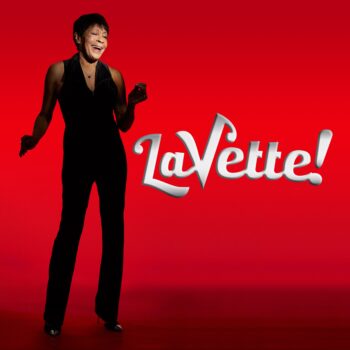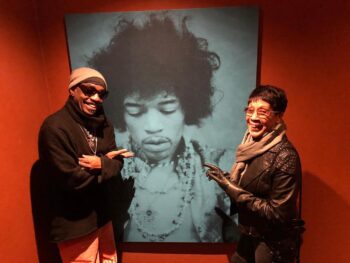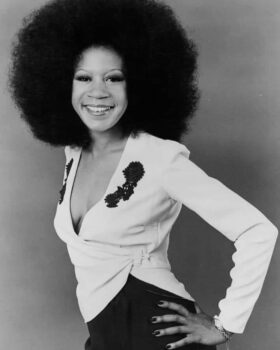Bettye LaVette Talks About Her Most Daring Album In Years: Interview
Veteran soul singer Bettye LaVette, has, at age 77, released what is being called her most daring album in years. The title is LaVette! And here she is to tell us about it.
 Bettye has once again teamed up with producer Steve Jordan, who is also the drummer for The Rolling Stones. So, why is this album so daring? Well, its a collection of songs by a relatively obscure songwriter who’s name is Randall Bramblett. Bettye and Steve have rounded up a few friends, including Steve Winwood, Ray Parker Jr and John Mayer to showcase Bramblett’s songs.
Bettye has once again teamed up with producer Steve Jordan, who is also the drummer for The Rolling Stones. So, why is this album so daring? Well, its a collection of songs by a relatively obscure songwriter who’s name is Randall Bramblett. Bettye and Steve have rounded up a few friends, including Steve Winwood, Ray Parker Jr and John Mayer to showcase Bramblett’s songs.
Click here to listen to the interview:
Or, read a transcription of the interview here:
MD: Have you been on the road? Have you been doing shows?
Bettye: Yes. You know, we’re introducing the new album rolling it out.
MD: Right. And how’s that been going? How have the shows been going?
Bettye: It went really, really well. These songs have been received just as I wanted them to be. These lyrics, they’re Randall Bramblett’s, are just exceptional. I wanted people to hear them clearly and hope that they liked them. And they seem to.
MD: I’m sure they do. Yeah, I mean, the idea of recording an entire album of Randall Bramblett songs is unique to say the least, you know, everybody’s doing Dylan or The Stones or The Beatles, or Joni Mitchell or somebody, Randall Bramblett is not high on that list. So how did that happen?
Bettye: I heard him eight years ago, he was on a gig with me and he was on the stage when I arrived at the gig. And I couldn’t hear what he was saying. And I couldn’t see him. But I could hear the melody and I could hear him. And I asked my road manager to ask him if I could speak to him when the show was over. And he came in, I told him, I said, I couldn’t hear what you were saying, but I love those melodies and I just hope the words are strong. Would you send me some of them? So he sent me some and I recorded two of them right away, Joe in me. And then when this opportunity came up with Steve (Jordan), and I had to do an album together that actually belongs to us, if you will, as opposed to a big company, I sent him songs. And he said, ‘I love every one of them’.
MD: Very good. So was Steve Jordan familiar with these songs? Obviously not.
Bettye: No, he wasn’t familiar with Randall. But he told me when Universal or Verve both kicked me out, Stephen said, Why don’t you find a writer to write some songs for you? Or, why don’t you find it to write with? And I said, because I can’t write. I don’t know why people think everyone can write. And I would want to write really good. Oh, I can write something. Make some kind of sense. But I want to write something really good. And I can’t do that. I also cannot ballet!
MD: Right!

Bettye: But…these songs. I keep getting asked the question, did I write them? Or did he write them for me? Because he’s the only person I know who has had more flopped records than I have.
MD: Well, there you go.
Bettye: We’re about the same age, we’ve done this for the same amount of time. Well, he took some time off and went to school so he’s smarter than me
MD: He’s just more educated there’s a difference. So have you been in touch with him, have you been in touch with Randall?
Bettye: Yes, yes. We talk frequently
MD: So what did he think when you first proposed this idea? What was his reaction?
Bettye: He said, ‘Who does that’? He was really quite surprised. And the speed with which we did it and got it out, stunned him because I think he thought I was gonna be wandering around with it trying to find somebody to do something with it. But I…years of wandering around in this businesses, if nothing else, has taught me two things: Not to spend a dime of my money on it. And do it quickly, get it done, they’re just songs. Come on out into the studio sing and shut up we’ll see what’s gonna happen.. So, Jay-Vee, Steve Jordan’s company, is small, but they are working like banshees. And they’re working me half to death, but I told them, I need you to work really hard and I will work as hard as I can and do anything you ask me to do. So it came out officially last week, and I did four gigs this past week on the West Coast. Now we’re going to do the East Coast things. And we like to go Midwest.
MD: Cool, cool. So the songs themselves, the 11 songs that make up the record, how were they chosen?
Bettye: I chose them…I have to choose my songs myself because it’s almost like you’re telling a 77 year old woman what to think.
MD: Nobody wants to do that.

Bettye: So I chose the songs. And I sent Steven the ones I liked. And they were good. I was surprised that he was so overwhelmingly enthusiastic about them. But I knew that they were good. There was no doubt about that.
MD: Right. Right. So then you recorded it mostly at Electric Ladyland studios, is that right?
Bettye: Uh uh, I did less than anyone else because just when we started to record, I caught COVID . So we laid the tracks down on Zoom. You know, everybody, all the musicians had a little box with my face in it and my voice. And we did it that way. So the tracks were laid down to my specifications in terms of my dictatorial, in the song and the way I wanted to sing the song. Stephen chose some of the most brilliant musicians in the world. And I just think they laid down some fabulous tracks.
MD: And you got some cool guests as well. People like Steve Winwood and Jon Batiste and Ray Parker. That’s not bad.
Bettye: No, it’s not. Not at all. Ray Parker was in my band when he was about 17. And Jon Batiste’s father was in my band when he was about 17, when I moved to New Orleans. And you know, Steve Winwood covered my Let Me Down Easy when he was about 17. So we’ve been going with this 17 and 18 number that something happened pertaining to me or my music to everybody involved when they were about 17 or 18.
MD: So you and Steve Jordan have been working together quite a bit over the years, how does that communication work between you? What is it that draws you together and keeps you together?
Bettye: Well, you know, I haven’t had a black producer in a long time. And a black producer, with a broadness, like a Quincy Jones is what I need, because I’ve become broader. So if you produced all of James Brown’s tunes, you may be a great producer. But I needed a producer who could produce James Brown tunes on me, as well as Bob Dylan tunes, because I’ve become that broad. And that doesn’t happen to a lot of black producers. Steven has had that opportunity to be a music director in some low and high places. And he’s now with the Rolling Stones with the television work that he’s done. And working with James Brown, he and I did both work with James Brown. So he, he goes, and then he hears whatever it is the way I hear it, because we didn’t grow up listening to a myriad of radio, we grew up listening to WWRL and black radio. So when we listened to Bob Dylan, we hear it differently. You know, and the only other black producer I know that it has the kind of range and understanding and experiences Steven has is Quincy Jones. And I chased him around for 20 years.
MD: Right! Now there’s a quote in some of the press or in the liner notes you’re quoted as saying ‘I haven’t thought of another singer since I was about 20’. So that I’m assuming is referring to being influenced by other singers and listening to them. I find that fairly intriguing. So was that something you did on purpose to keep your own sound? Or is it just the way it went?
 Bettye: You can’t take my sound away from me! When people say, How do you make the songs your own? I said, it’s so much easier for me to sound like me than Paul McCartney.
Bettye: You can’t take my sound away from me! When people say, How do you make the songs your own? I said, it’s so much easier for me to sound like me than Paul McCartney.
MD: Yep.
Bettye: So I don’t understand it. And I’m very ego maniacal singer. So when I hear a song I like, I hear me singing. That is what I hear when I hear the song.
MD: Do you hear songs that you can’t sing or won’t sing?
Bettye: Not now, because it took me almost 20 years to learn it. But if I just sing like I sing, there’s no problem. When I was younger, I was trying to sing like the person that I heard. But to sing like me is no problem.
MD: Very good. So I see you also cover an interesting array of…I think you just did a Fiona Apple tune when you were playing in California a few days ago. So how do you come across these other songs that you cover?
Bettye: OK, let’s clear this up first, Pat Boone is a cover artist.
MD: Okay, I got ya!
 Bettye: Those particular songs, I didn’t know any of those young ladies or at least I only knew maybe a couple of them Dolly Parton and maybe one other. But my producer was young. So he knew all of these people. And he brought me the songs in there. It doesn’t make any difference who they are. They’re just songs. The only names that might have frightened me at one time might have been Dinah Washington and Johnny Hartman. But I found out that I didn’t have sounded like him. All I have to do is sing it like I sing. You’d be surprised that really, that took me 20 years to completely grasp what my manager then, Jim Lewis, taught me everything I know. I didn’t understand that. And I said, but I don’t have a sound. You know, when I was like 17 or 18, and he was trying to tell me sing it like you sing it. But I don’t sing it, I just heard it. And he said, Oh, God, this girl is going to kill me.
Bettye: Those particular songs, I didn’t know any of those young ladies or at least I only knew maybe a couple of them Dolly Parton and maybe one other. But my producer was young. So he knew all of these people. And he brought me the songs in there. It doesn’t make any difference who they are. They’re just songs. The only names that might have frightened me at one time might have been Dinah Washington and Johnny Hartman. But I found out that I didn’t have sounded like him. All I have to do is sing it like I sing. You’d be surprised that really, that took me 20 years to completely grasp what my manager then, Jim Lewis, taught me everything I know. I didn’t understand that. And I said, but I don’t have a sound. You know, when I was like 17 or 18, and he was trying to tell me sing it like you sing it. But I don’t sing it, I just heard it. And he said, Oh, God, this girl is going to kill me.
MD: Well, I mean, to be fair, there are very few teenagers who can immediately go this is who I am and what I sound like. Most of them are fairly derivative.
Bettye: Yeah, he came from the big band era and the Jimmy Lunceford band. And he just looked at it differently. He said, You may never be a star. But if you will listen to me, you can do this for the rest of your life. I didn’t know that was going to happen.
MD: But he was right! So this has turned into the rest of your life, this is what you’re doing. It must be very satisfying to at this point at the age 77, look back and realize the trajectory that your career took and where it’s taking you now.
Bettye: Oh, it certainly has. I thought I was going to die broke and obscure. I’m just going to die broke, but I’m not going to die obscure. But it’s the things that have happened in the last 20 years I’m extremely proud of and I just never thought that I would have any more than like little pocket in Australia and New Zealand that knew about me because they love live music. And a little pop kid in England that knew about it. And black radio was gone. And I hadn’t made it to white radio. So I never thought that all this would happen to me. So when you consider who my immediate contemporaries are, because I’m from Detroit, you know, these people who were my neighbors and who I went to school with have become mega stars. So I still haven’t achieved that. But as I said, I’m so much farther along than I thought, after about 25 years and nothing had got broad or deeper or anything. But I was learning all the time, and I was getting better and better and better. And that was what Jim told me I would do. And I was like, especially after I’ve been singing about 20 years, it won’t get any better.
MD: And I would say that compared to your contemporaries, you’re one of the few who is actually trying out new things and creating new music and not just resting on their laurels as well.
Bettye: Well, I ain’t got no doggone laurels!
MD: All right.
Bettye: I’m making them up still as I go along. On the album, Plan B, it says, I ain’t worried about it. I ain’t got no plan B. I’m still working on Plan A.
MD: I love it. So speaking of your plans, what are your plans next? Because from what I understand, you’re always thinking in advance, you’re always thinking about the next thing.
Bettye: I am not. No, my husband’s always thinking about that. Yeah, he already knows what he’d like me to record for another 20 years. I’m like, I’m not gonna live long enough to record all this. But he has, and he’s probably got five more albums on a computer that he that I have signed off on, and he will make me sit down and pick tunes. He’ll say, you like this. And you’ll just keep playing it, whatever. And after I like it, and he puts it in a file for me. So he’s got country albums and blues albums and show tunes that I actually like and would record. And I’m grateful for that. He loves music. And he’s a music enthusiast. I like old movies. I’m an old blues singer.
 MD: So I saw you when you were here back in 2005. Have you got any plans to come back to New Zealand?
MD: So I saw you when you were here back in 2005. Have you got any plans to come back to New Zealand?
Bettye: You know its so funny, Kevin and I were talking last night about how we…he was playing some old tunes…I just got home last night, so I was glad to see him. So he had me trapped in the office listening to these tunes that we listened to when we first got married. Our anniversary is coming up soon. And when we first got married, I came over there (NZ) with Charlie Musselwhite on that little tour. And at night, we did’t know where we were going, but there was no one on the streets pretty much in wherever we were in New Zealand. And we were walking and we were singing this song. And he started ‘to just walk these hills once more with you’. And we were harmonizing on that and walking through the city. And we were walking the streets and singing that song.
LaVette! is out now.
Click here for more Bettye LaVette

